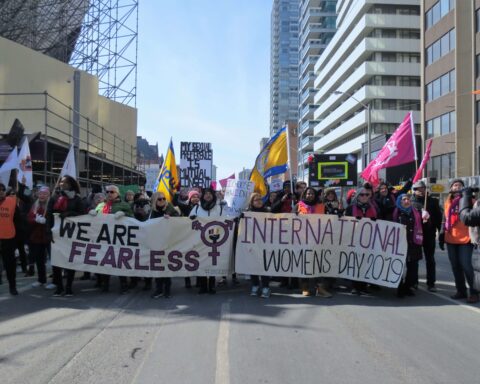A new survey suggests immigrants are less likely to experience sexual and other harassment in the workplace, but experts say it’s more likely that fear of reprisal is preventing newcomers from reporting the incidents in the first place.
The survey by Statistics Canada titled, “Survey on Sexual Misconduct at Work,” found that one in three immigrant women (35 per cent) and one in five immigrant men (20 per cent) reported having experienced harassment or sexual assault in the workplace.
This contrasts with 52 per cent of Canadian-born women and 36 per cent of Canadian-born men.
“Understanding this breakdown is crucial because it could reveal significant variations in reporting percentages among these three groups,” said Calgary-based Rowan Fisher, managing lawyer of the immigration division at Osuji & Smith Lawyers.
“It’s [under reporting] very hard to know, statistically, it’s more easy to understand from a cultural and an immigration context.”

(Contributed photo)
Immigrants include temporary foreign workers, permanent residents, or citizens. Fisher said the impact of reporting such incidents is far higher on temporary foreign workers
“They don’t report because of the fear that if they report and it impacts their employment situation, they will therefore be in violation of their conditions on their work permit, and they will no longer be eligible to stay in Canada.”
Temporary foreign workers also fear losing their jobs, and jeopardizing their permanent residency. “Many temporary foreign workers aim to accumulate a year of work experience to qualify for permanent residency,” she said. “However, if they lose their job and can’t find another one, it jeopardizes their permanent residency application progress, potentially causing them to lose the months they’ve already worked towards it.”
The survey found that among immigrants, Latin Americans reported the most incidents of harassment, at 39.8 per cent, followed by South Asians at 26.6 per cent and Chinese at 26.4 per cent.
Among racialized women, 35 per cent reported experiencing harassment or sexual assault in the workplace, and 20 per cent of racialized men reported harassment incidents. Among non-racialized workers, 51 per cent of women and 35 per cent of men reported experiencing harassment or sexual assault.
Akshaya Shashidhar, a Mississauga-based product manager for a telecom company, runs an informal network that helps immigrants with references for real estate, jobs, sports and outdoor activities. She believes immigrant women often face many challenges, including language barriers, unfamiliarity with their rights, and the looming fear of retaliation or deportation. These challenges significantly hinder their ability to report incidents or seek assistance, resulting in pervasive underreporting.
“Many women grapple with the fear of stigma or shame within their communities should they choose to speak out against harassment,” Shashidar said.
“This fear often compels them to suffer in silence, opting to avoid potential negative repercussions rather than confront the issue openly.”
She said immigrant women frequently lack strong support networks or access to resources that could aid them in navigating such challenges. This dearth of support further compounds their vulnerability and impedes their ability to address instances of harassment effectively.

Rizwana Majith, founder of the Association of Tamil Community in Canada, said immigrant women benefit from awareness programs and career workshops that provide platforms for women to openly discuss the challenges they face and share strategies for overcoming them — and prepare themselves with proactive measures to address instances of harassment or assault if they arise.
Shilpashree Jagannathan is a journalist from India. She now lives in Toronto and has worked as a business reporter for leading newspapers in India. She has tracked telecom, infrastructure, and real estate news developments and has produced podcast series. She currently focuses on human rights, feminist movements, and other related issues in Canada and India. Her weekends are spent bird watching in one of the Toronto birding hotspots; she loves trails, biking, and a lot of sun.



